From playing behind his parents’ back to reaching the top, this Fifa gamer now has SEA Games in his sights
In the first part of a series on Singapore athletes headed for the SEA Games, Matthew Mohan speaks to a gamer whose unorthodox path has taken him to unexpected places. Next up, Hanoi.
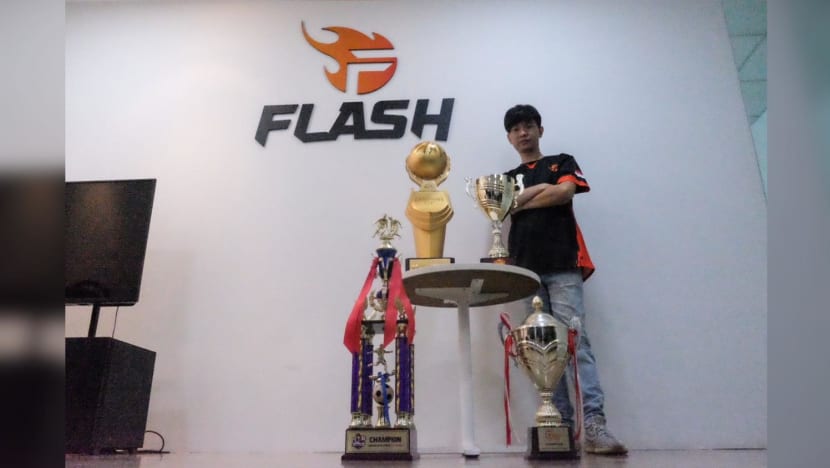
Joseph Yeo will be representing Singapore at next month's SEA Games. (Photo: Matthew Mohan)
SINGAPORE: The opposition go one goal up and start time-wasting. As the clock ticks down, they have the upper hand and they know it.
But the other team in red are unfazed. They have seen such antics before. They hound and harry, persevere with pressing high, chasing down every loose ball.
Then they reclaim possession.
A couple of attacks go nowhere, until Portuguese legend Eusebio emerges with the ball. He slides a pass through for Son Heung-Min, and the South Korean bends a shot past the goalkeeper.
Son celebrates, the crowd roars, but e-sports gamer Joseph Yeo barely blinks.
It is after all just another practice match of Fifa Online 4 to the 28-year-old - one of the hundreds he will play as he prepares for the SEA Games.
Come next month, the online multi-player football game will make its Games debut in Hanoi, Vietnam, with Yeo one of four players to fly the Singapore flag in the event.
"When I was young … we always watched SEA Games. I never one day expected e-sports would be part of it," he told CNA.
LOVE OF THE GAME
The path he chose was not something his family wanted for him.
During his secondary school days, the Wi-Fi in the Yeo household would go dark at about 10pm daily.
The skinny teenager would wait until the coast was clear, before slipping into the living room to revive the Internet connection.
"I had to wait for my mother to go to sleep. I had no choice," he said.
"The worst thing is my computer was outside in the living room so it was very hard to hide. She put it in the living room so that whenever I played, she would know."
As the familiar glow of the monitor lit up the dim space, a familiar world and unfamiliar foes came to life.
Fifa Online 2 beckoned.
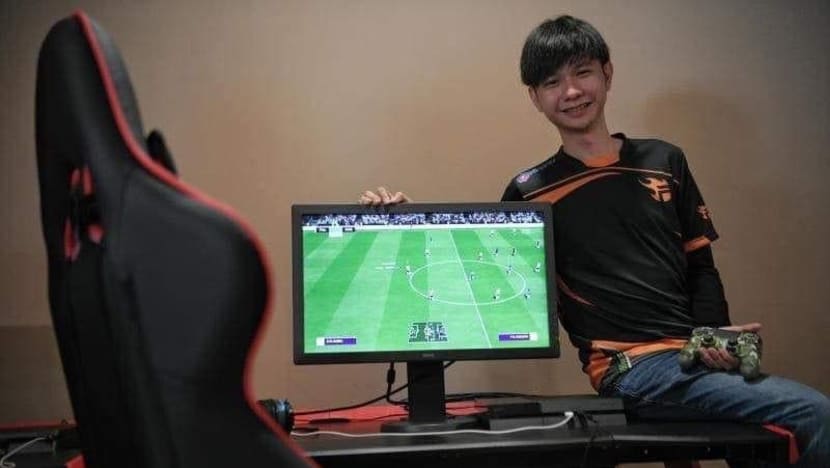
Yeo's love affair with the game started years earlier with a gift - the Playstation 1. Still in kindergarten then, he loved it, and games such as Tetris and Puzzle Bopper intrigued his young mind.
But one game stood out. It was popular at gatherings and one that Yeo enjoyed playing with his cousins.
"My cousins (would) always come over and I always played Fifa, (and) watch soccer (with them)," he told CNA.
By chance, Yeo would take part in his first competitive tournament when he was a secondary four student.
He had wanted to buy players in the game but didn't have a way of transferring the money to the seller beforehand. Instead, they arranged for an in-person meet-up at a tournament venue.
Yeo ended up registering for the tournament and finished in second place. His prize? S$100 in cash.
"When I took part in this one tournament and got to know more people, then I realised that all along there are actually so many tournaments around but I didn't know (about them)," he said.
"When I got interested, I went to do more research. Then I started to take part in more tournaments."
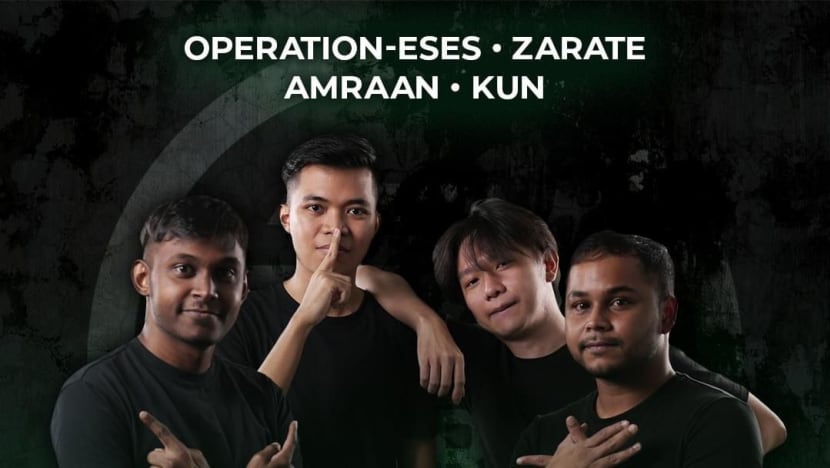
Yeo went on to compete in his first regional meet that year.
But there was a problem. As the event was held over three days - Friday, Saturday and Sunday - taking part also meant skipping a day of school.
"My mum didn't know at first but my teacher called her. You know why my teacher called her? Because my friends told her," he recalled, bemused. "(I got scolded) when I got back home. It was quite bad."
But the youngster has no regrets.
"I didn't do well at that tournament but I was happy to represent Singapore. (I wanted to participate in that tournament) for the experience … I just wanted to try," he explained.
A "NAIVE" DECISION
During his first year as a marketing student at Nanyang Polytechnic, Yeo found himself disinterested in his studies.
Much of his time was spent training for competitions and playing Fifa Online 2 at home. Schoolwork took a backseat.
"My attendance was very bad and that meant I had to retake a lot of modules," he said.
"My mum went to school, and spoke with one of the lecturers. Then they mentioned that I only had to retake a few modules ... So if people do three years, I could do three-and-a-half years."
But Yeo had his mind made up. He dropped out of school to become a professional gamer.
"I was naive. I didn't think that much, I just want to play (Fifa) ... I just told my mum that I didn’t want to study," he explained.
"At that point of time, there wasn't really much of a ecosystem where there were pro teams, there were full-time contracts, salaries and stuff ... I think I was just young and naive that I wanted to just try (to turn pro) - that affected me not going to school."
His parents were none too pleased.
"I come from a very traditional and conservative family," he said. "My mum thinks that I have to go to school, work nine to five, get a job, then get married - that kind of thing."
Years later, with the benefit of hindsight, Yeo acknowledged that the decision could have backfired.
"I didn’t think about it and after that when I thought about it, I realised that there was a high chance that … nothing came out of it (the decision)," he said.
"I was just lucky that the ecosystem improved a lot. Things escalated very quickly, and I just happened to be there."
His mother would also grow to show her support for him, such as always sending him off before competitions and making sure he got his foreign currencies for trips.
"She doesn't care about the result, even if you lose or you win (it doesn't matter)," added Yeo.
Then came a newer edition of the game - Fifa Online 3 - which Yeo said was a game-changer.
He started to notice more interest among players, more tournaments and a larger prize pool for Fifa Online 3 competitions.
"This made me realise that there might be something to look forward to. It’s not like playing Fifa Online 2 where 'ownself play, ownself happy'," he said.
Yeo would then feature in a regional tournament where his team finished second, before competing in a Fifa Online Asian-level tournament then known as the Spearhead International.
Yeo's team were eliminated in the group stages and the same fate befell them in the next edition.
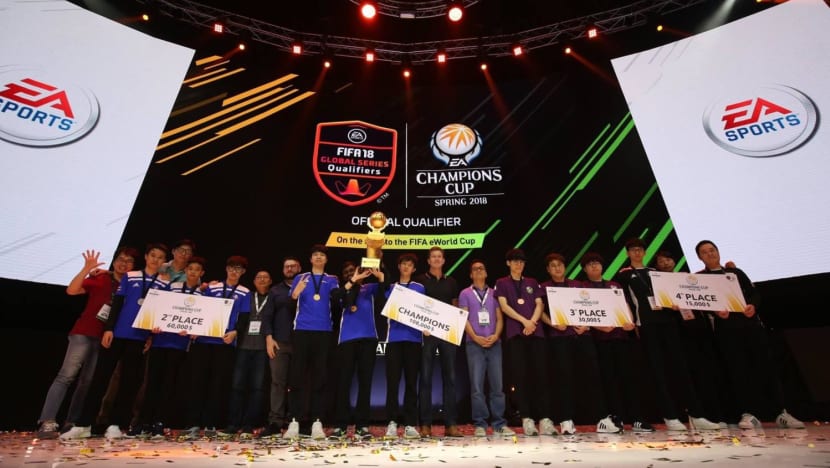
Then came the turning point in 2016.
That year, Yeo and his eliminated team-mates watched on as a Malaysian team clinched bronze at the EA Champions Cup (EACC) Summer 2016.
This was a team they shared the same server with, a team that they were familiar with and a team they felt they could beat, recalled Yeo.
"I asked myself, I'd played for so long, Malaysia can do it, why I can’t do it? So I went back to train very hard," he added.
"We talked about it and we wanted to make sure the next EACC that we would qualify and we wanted to do something about it."
Then still in the army, Yeo recalled a regimen of booking out, heading home, and spending three to four hours practising before sleeping. He had to report to camp at 7.30am the next day, but it didn't matter.
Weekends were for training and taking part in community events, no matter how much the prize money.
Yeo would compete in the next edition of the EACC later that year, just days after his operationally-ready date (ORD). Yeo, Amraan Gani and Chiang Wen Jun would finish third, taking home US$60,000 (S$86,700) as their reward.
CHINA COMES CALLING
In 2017, Yeo signed a contract in China with e-sports side EM United.
"Because of the performance in Thailand and (performances) before that then I had opportunity to go to China," he said. "At that point of time I felt that the playing quality in Singapore was not at the level of China, so I can go there and learn and improve myself faster."
But with it came added pressure.
Each team could sign a foreign player, who was expected to "dominate", recalled Yeo.
That same year, his team would go on to win China's Fifa Star League (FSL), with Yeo clinching victory in the deciding match.
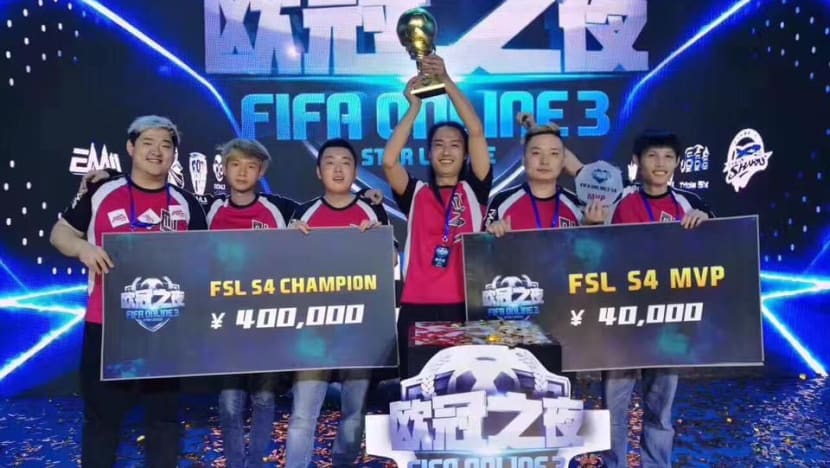
What sticks with him till today was the coaching he received in China.
Yeo recalled having to practise virtual penalty kicks after each training session, a weakness that his coach had identified in his gameplay.
"Every night I would have to score 10 consecutive times in each corner before I sleep. So halfway through if I missed or I just clicked (the shot power) a bit lesser or a bit more, (I would have to) restart," he said.
"He (my coach) felt that penalty kicks can be an advantage. Because when most games get very cagey, it normally goes to penalty kicks. And he just wanted to prepare me for it."
There would be no sleep for Yeo until he netted 40 penalties, 10 in each corner of the goal.
But he appreciated the guidance, as this was the first time he had a coach.
"(A coach) helps with in-game gameplay ... If I'm playing the game myself, then there's only one cursor and I'm focusing on where I’m passing the ball. So a lot of times, I'll be very 'tunnelled' in my vision on what I'm doing," Yeo explained.
"We could sit down and watch replays and (he could) let me know how I could do better, what opportunity did I miss, how can I pass better, how can I defend better."
A coach also doubles up as an analyst to help a player study the opponents, Yeo noted.
"When I had the coach, it was very helpful to analyse for me which formations are better," he said.
"He would explain to me why which players are better ... for example - (Angel) Di Maria - he's a left-footer, because in (the) game he has a 'five star' left foot and a 'two star' right foot."
Yeo's big moment came in April 2018, where he, Amraan and China's Fifa Esports player of the year Li Si Jun combined to win the East Asian Champions Cup Spring, the biggest international tournament for the game.
Representing Singapore e-sports side Team Flash, the trio beat home side Thailand 3-0 in the final, claiming US$108,000 (S$142,000) in prize money. This was the best finish for a Singaporean team in the event.
"I wouldn't say I was surprised, but I wouldn't say that I expected our team to win for sure. I think coming to the tournament, I felt we had an equal shot but it was hard," said Yeo.
"I felt that if I really didn't win, then I would have regretted my decision to play (full-time). Because at the end of it, what's worse is if I play for so many years and nothing comes out of it."
'AN HONOUR' TO REPRESENT SINGAPORE
Yeo, now a team manager for Team Flash, is no longer a professional gamer.
However, he was selected to be part of Singapore's four-man Mixed Fifa Online 4 SEA Games team along with Amraan, Ahmad Sufian Rahamad and Muhammad Syakir Abdul Rauf.
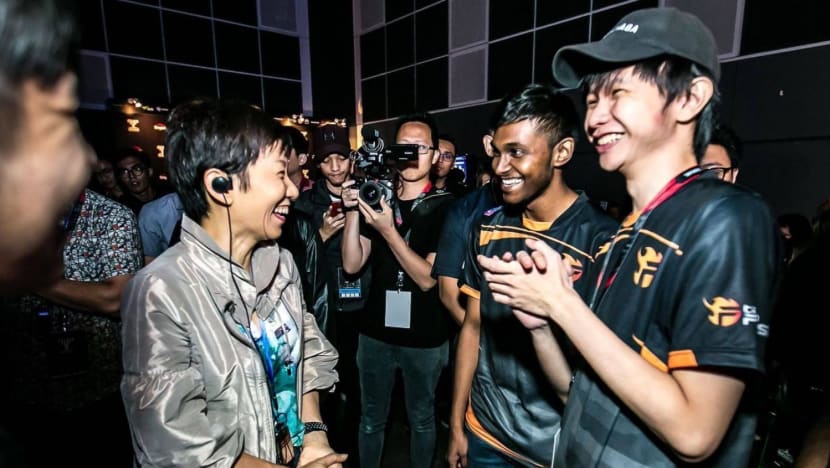
"It’s the SEA Games. It’s an honour to represent the country, it’s a very rare opportunity ... I’d been playing for nine,10 years but there was no such a thing ever," said Yeo.
"It’s the first (time), so it's as good as a once-in-a-lifetime opportunity. What could possibly happen is the next SEA Games, there might not be Fifa. We never know. So I think it will be worth the effort."
This is only the second time e-sports will feature at the SEA Games, and Yeo noticed how views towards gaming are becoming "more positive".
"Many years ago … I think the perception was still not great. I think parents were still against kids playing games or spending a lot of time on games. I had friends who said and mentioned that playing games are a waste of time. Many people told me that I should go and find a proper job," he said.
"At this moment, perception is getting better. People are more accepting of it. They realise that e-sports has longevity. You can be a player, after (that) you can be a manager, you can be an events person, you can be a content person, you can be video editor. There are a lot of paths."
As part of his daily routine, Yeo plays between 15 and 20 games, on top of training with his team-mates where possible. Rather than focusing on beating random opponents he is matched with online, he makes use of each game to work on specific areas where he feels need strengthening.
This could mean only attempting shots from distance, or ceding possession intentionally to allow his opponent to counter-attack, so that he can work on defending.
"One key thing is to watch other countries’ tournaments. Currently, we can watch the SEA Games qualifiers for other countries like Thailand, Vietnam," he added.
"I think that Thailand and Vietnam, they are the stronger countries, especially Thailand. So their replays are worth watching ... We can get into their perspective and see what are the things that they do ... what you would have done and you see the difference from there."
At Team Flash's office in Ubi on a Tuesday morning, Yeo is matched with a new opponent.
More matches to play, more goals to score, and more skills yet to learn.
He clicks on his mouse, the whistle blows, and a new game begins.

















